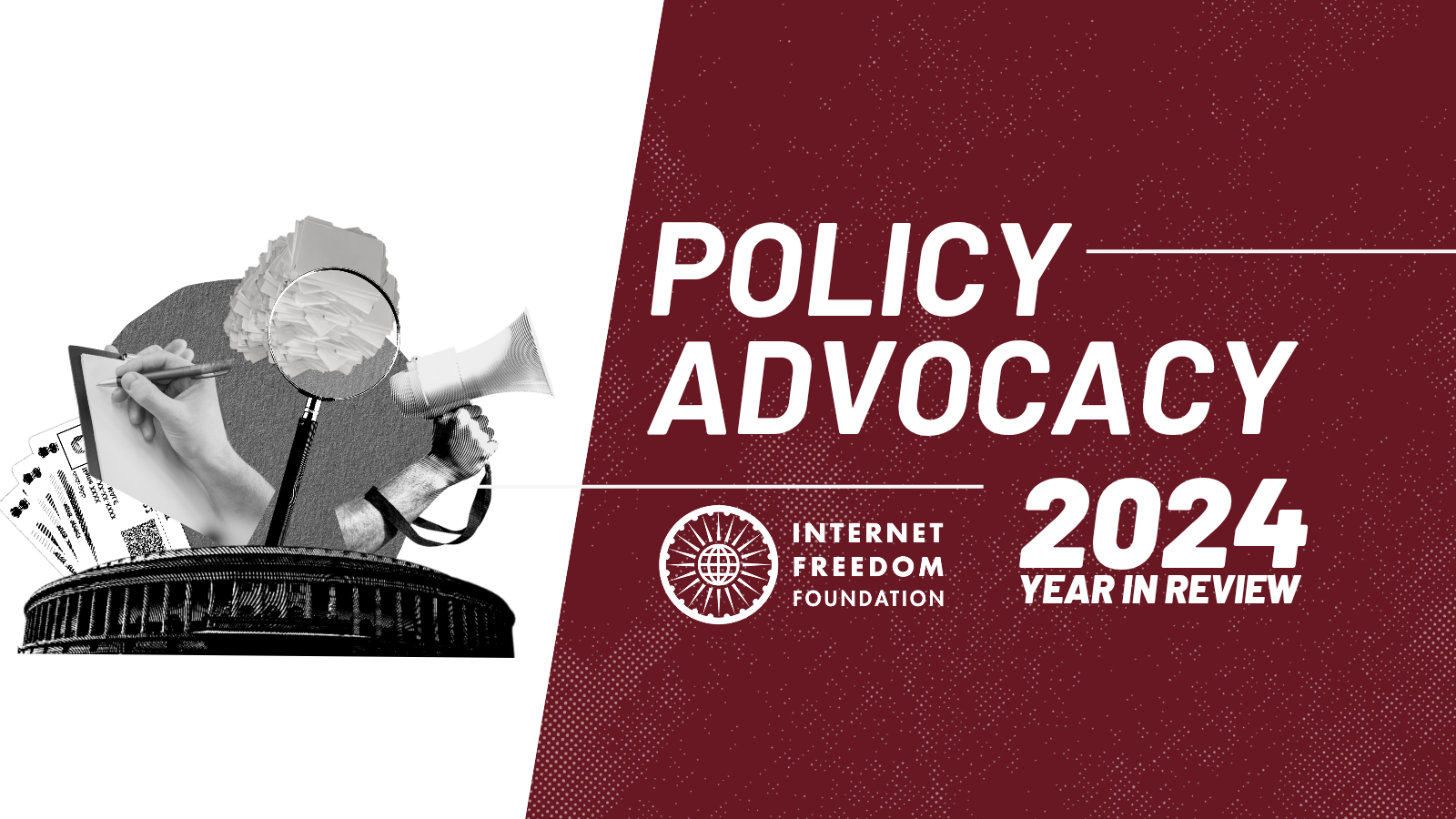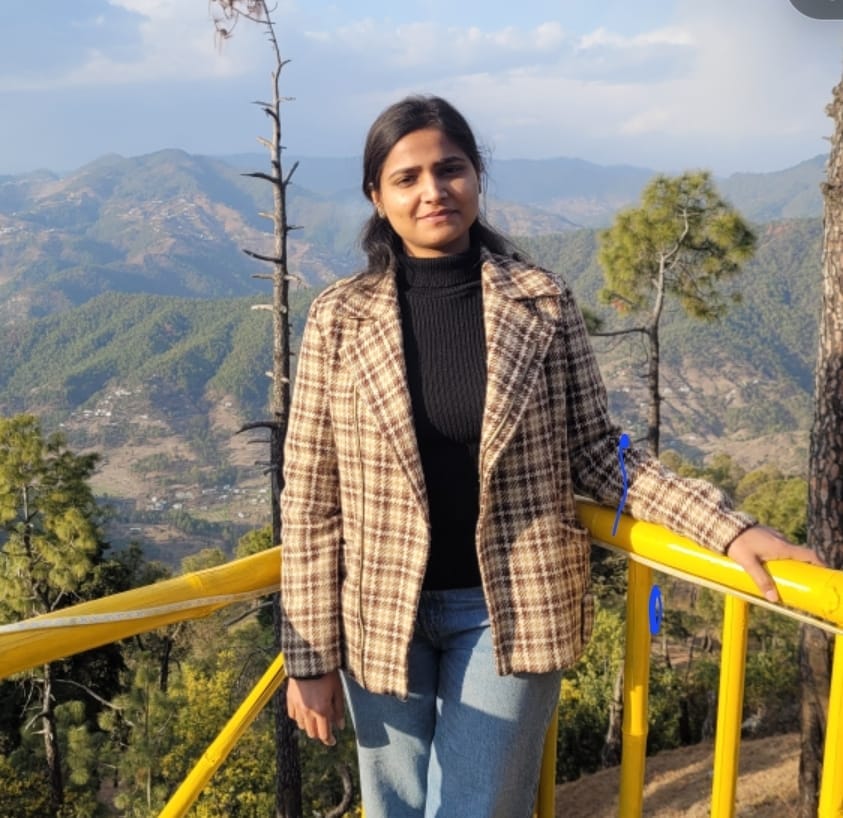
tl;dr
The policy team at IFF engaged in 9 consultations, sent 85 letters, and tracked 511 RTIs. Through persistent advocacy, we stopped the use of drones and facial recognition at polling stations during the 2024 elections and pushed the MIB to withdraw the revised Broadcasting Bill, 2024, with campaigns like #LetUsChill. We authored briefs, explainers, and summaries, collaborated with organizations, and deepened engagement with MPs to advance a secure digital environment for citizens. By simplifying complex issues through rapid responses, Twitter threads, and citizen campaigns, we sparked meaningful conversations. We are deeply grateful for our community’s support and remain committed to continuing this work. Read more about our year-long advocacy efforts in this blogpost.

We’ll let the numbers do the talking
Over the course of the year, we participated in 9 consultations with Union, State governmental bodies and International organisations (a full table of consultations we participated in is included below). We also sent a total of 85 letters to various governmental and non-governmental bodies on pertinent digital rights issues in the year 2024. Lastly, IFF’s policy team submitted 150 Right to Information requests to collect additional information to support and enhance our work.

The impact we could make
Prevention of Drone and Facial Recognition Technology in 2024 Elections
IFF successfully stopped the deployment of drones and facial recognition technologies in the 2024 elections. In December 2023, the National Informatics Centre (“NIC”) issued a tender to acquire surveillance equipment, including drones and facial recognition systems, for monitoring the Union and State elections. Reportedly, the plan involved live webcasting, voting and counting processes, setting up a centralized command center, and deploying field surveillance vehicles and facial recognition for voter verification. This plan raised serious privacy concerns, including risks of voter intimidation and exclusion errors. On January 17, we wrote to the Election Commission of India (ECI) and NIC to withdraw the tender. The next day, we published a summary of our letter on social media, including a Twitter thread, calling for the tender's cancellation. Just two days later, the ECI spokesperson confirmed in a response to our thread that the ECI had directed the NIC to cancel the tender. Following which, the NIC Service Centre posted that it has formally cancelled the tender.

Withdrawal of Broadcasting Bill, 2024
We successfully pushed the Ministry of Information and Broadcasting (MIB) to withdraw the Broadcasting Bill, 2024. After consultations on the 2023 Bill, MIB reportedly circulated a watermarked draft of the 2024 Bill, which could impose compliance obligations on digital creators and negatively impact free speech. In response, we launched the #LetUsChill campaign, by mobilizing thousands to demand the Bill be scrapped. On August 1, 2024, we also collaborated with digital creators and organized a social media storm with #KillTheBill and #ContentBachao hashtags. We also urged Members of Parliament to oppose the Bill, providing them with a comprehensive explainer on its threats to Constitutional free speech. To highlight the Bill’s impact, we published a cheat sheet on its penalties for creators. Amid mounting pressure, the MIB reportedly asked stakeholders to return physical copies of the 2024 Bill for reconsideration. On August 12, 2024, the MIB announced that the Bill would be “withdrawn” and a new draft would be released following further consultations, extending the deadline for comments on the 2023 Bill to October 15, 2024.

Spread awareness about privacy issues with Digiyatra
Many passengers have raised their concerns about the forced and worrisome implementation of DigiYatra at various airports and reached out to us for support. In response to these concerns and to make the key stakeholders accountable, we reached out to Ministry of Civil Aviation , NITI Aayog, Airports Authority of India, Digi Yatra Foundation, and the Delhi, Bengaluru, Mumbai, Cochin and Hyderabad airports urging them to completely withdraw DigiYatra from Indian airports owing to its large gamut of concerns relating to privacy, surveillance, exclusion errors and lack of institutional accountability and transparency. In collaboration with several artists like Kruttika Susarla and Sanitary Panels, IFF released an all-you-should-know leaflet and a line of merchandise (tees, totes and more!) with a call to #RejectDigiYatra.

Collaborations
Advocacy before General Elections 2024: The rapid advancement of generative AI technology has reshaped the political landscape, we assumed it would present both challenges and opportunities for the 2024 Indian election. To be ahead of the curve, we requested all political candidates and affiliated organisations to publicly commit not to use deepfakes technology to create deceptive or misleading synthetic content in the run-up to and during the 2024 general elections. We shared an open letter with Parliamentarians, union level and regional political parties, and their affiliated organisations to ask for their endorsement of this letter. This letter was also open for signatures from the public. We would like to thank MediaNama, Point of View, Digital Empowerment Foundation, Access Now, One Future Collective, Mazdoor Kisan Shakti Sangathan, Young Leaders for Active Citizenship, Maadhyam, Article 21 Trust, India Civil Watch International for their inputs on the letter, and for publicly endorsing it. We also extend our gratitude to the 14 organisations and 217 individuals who signed the letter so far.
On April 08, 2024, 11 civil society organisations including IFF wrote to the Election Commission of India (“ECI”) in a collaborative effort, highlighting the role of technology in affecting electoral processes and outcomes. The letter includes an urgent appeal to the ECI to uphold the integrity of the upcoming elections and hold political parties, candidates, and digital platforms accountable to the voters. The signatories to the letter were Article 21 Trust, Association for Democratic Reforms, Campaign Against Hate Speech, Common Cause, Internet Freedom Foundation, LibTech India, Maadhyam, Mazdoor Kisan Shakti Sangathan, National Alliance of People's Movements, Rajasthan Asangathit Mazdoor Union, and Software Freedom Law Center, India.
IFF’s submission to the UN Human Rights Committee: We sent our submission in June to the United Nations’ Human Rights Committee ahead of India’s 4th periodic review. In our submission we deeply analysed the state of privacy, dignity, free speech, and other constitutional guarantees and its judicial interpretations between 2019 and 2024.
YLAC: In September, we collaborated with Young Leaders for Active Citizenship (YLAC) fellows on two projects namely, ‘Analysing Children's Access to Social Media Platforms in India’ and ‘Internet Shutdowns in India: Assessing Human Rights Implications’.
The Glass Room: Misinformation Edition in Kochi: We hosted a 7 day exhibition with TinkerSpace in collaboration with Tactical Tech in Kochi exploring how false information spreads in the digital age & the role each one of us plays through our many clicks, likes, and shares.
Collaboration with Goethe-Institut: On October 17th and 18th, 2024, we organized a workshop in collaboration with Goethe-Institut, Tactical Tech, and Quicksand, which focused on the relationship between citizens and the ‘digital’ state. As part of the workshop, we also organized a panel discussion titled 'Seeing Like a Digital State, Advocating Like a Citizen.'
Our engagement with key legislations, rules, and regulations
WHO’s Draft Principles for Human Genome Data Access, Use and Sharing, 2024: On May 3, 2024, we submitted our comments on the Draft Principles for Human Genome Data Access, Use, and Sharing, 2024, released by the World Health Organisation.
UNDP’s Interim Report on DPI Safeguards and Governance: UNDP released its report ‘Leveraging DPI for Safe and Inclusive Societies’ in April 2024 and in our submission, we addressed certain issues posed by DPIs.
Four draft rules under the Telecommunications Act, 2023: On August 28, 2024, the Department of Telecommunications [“DoT”], Ministry of Communications [“MoC”] released four draft rules under the Telecommunications Act, 2023, with a 30 day deadline for public comments. We submitted our comments on the rules, namely the draft Telecommunications (Procedures and Safeguards for Lawful Interception of Messages) Rules, 2024, draft Temporary Suspension of Telecommunication Services Rules, 2024, draft Telecommunications (Telecom Cyber Security) Rules, 2024 and draft Telecommunications (Critical Telecommunication Infrastructure) Rules, 2024.
On November 21, 2024, DoT notified the Telecommunications (Telecom Cyber Security) Rules, 2024 (“Telecom Cyber Security Rules, 2024”) and we released a first read highlighting major changes from the draft rules issued in August 2024. Read our initial review of the other notified versions of the Telecommunication (Temporary Suspension of Services) Rules, 2024, Telecommunications (Critical Telecommunication Infrastructure) Rules, 2024, and the Telecommunications (Procedures and Safeguards for Lawful Interception of Messages) Rules, 2024.
Cigarettes & Other Tobacco Products Amendment Rules, 2024: On 13 September 2024, the Ministry of Health and Family Welfare issued the draft COTPA Amendment Rules, introducing non-skippable tobacco health warnings on OTT platforms. In response, We submitted a consultation response highlighting concerns over creative freedom, jurisdictional conflict, and the potential negative impact on the OTT industry's growth.
The draft Digital Competition Bill: On March 12, 2024, the Digital Competition Law Report and draft Digital Competition Bill, 2024 were published by the Ministry of Corporate Affairs, with a deadline of April 15, 2024 for comments. In our submissions, we addressed four key concerns: issues in the consultation process, gaps in data protection law, potential regulatory overlap, and the proposed regulatory approach under the Bill.
IFF’s Awareness Drive
Public Briefs and Explainers: In our efforts to simplify complex policy and legislative resources, we published 10 public explainers, summaries, and briefs. We authored our public briefs, summaries, and explainers on the following topics:
- APAAR ID (link)
- Broadcasting Bill, 2023 (link)
- Digital interventions in Mahatma Gandhi National Rural Employment Guarantee Act are undermining rural social security (link)
- MeitY’s conflicting approach to tackling the issue of deepfakes (link)
- A massive data leak in Tamil Nadu Police’s FRT database (link)
- NHA’s health security scheme and related privacy concerns (link)
- TRAI recommends introduction of a service that will allow the name of the caller to be displayed to the recipient. (link)
- A comparative analysis of five state-level digital media/influencer policies (link)
- Ministry of Culture’s Constitution 75 website and associated privacy concerns (link)
- Web scrapping to train AI models (link)
Increasing awareness through Twitter: This past year, we made an effort to capture all issues, however big or small, and improve public attention around it. To that end, we started documenting global as well as local issues or developments relevant to digital rights on Twitter. We keep a track of Indian citizen's digital rights in the Parliament and give updates on digital rights from Parliament. For this purpose we use a hashtag @IFFonParliament . To check out other threads, see the following hashtags on Twitter: #EveningReads and #NewsPickOfTheDay #Contentbachao #KillTheBill. We list below some threads which captured privacy concerns arising out of certain developments.
- Empanelment of social media influencers through Goa Social Media Policy.
- Privacy concerns with Constitution day website launched by the Ministry of Culture.
- Concerns with selective sharing of Revised Broadcasting Bill, 2024 with few industry members.
- Privacy Concerns with use of Facial Recognition Technology at airports.
We know how much you like memes, so we have used them to raise awareness on key digital rights issues. Visit our Twitter page to see how we're driving meaningful conversations through creative advocacy.
Explainer videos
This year, we released 10 videos highlighting key digital rights issues, including free speech concerns in the UP Digital Media Policy, privacy risks in the Digi Yatra system, cybersecurity flaws in the Telangana police data breach, and the DPDP Act's privacy gaps. We also covered Haryana's internet shutdown and the Broadcasting Services (Regulation) Bill's impact on free expression, aiming to inform and engage audiences on these crucial topics. We list below videos addressing key digital rights.
- UP Digital Media Policy: Free Speech at Risk? (Link)
- What’s the MIB Hiding? Unpacking Their Response to Our RTI (Link)
- Kill the Bill: Unpacking the Controversial Broadcasting Policy (Link)
- Cybersecurity Crisis: Telangana Police Data Breach Explained (Link)
- DPDP ACT 2023, failing to protect your privacy? (Link)
- Digi Yatra: A privacy Setback (Link)
- Disconnected Voices: Haryana's Internet Shutdown and Freedom of Speech and Expression at Stake!! (Link)
- Bombay High Court’s Split Verdict on IT Rules 2023 (Link)
- Concerns over Broadcasting Services (Regulation) Bill, 2023 (Link)
- IFF's video on the WhatsApp messages (link)
- Telecom Act, 2023 (Link)
Raising privacy concerns through letters
CCTV surveillance during exams : The use of CCTV and AI-enabled cameras during exams by bodies like NTA and UPSC raises serious privacy concerns and heightens stress in already high-pressure environments, without sufficient safeguards or legal basis. We wrote to the Minister of Education, Chairpersons of UPSC and NTA, and the Director of the Karnataka State Education Board explaining the negative impacts of surveillance and urged them to take necessary steps to preserve the privacy of all implicated parties, and recall this action with immediate effect.
Use of Aadhaar biometric and facial recognition enabled attendance systems: The widespread adoption of biometric systems, such as AEBAS and facial recognition, for attendance tracking across government offices, schools, and public services poses significant privacy risks. Deployed without adequate safeguards, these systems violate individuals' fundamental privacy rights, promote excessive data collection, and expose sensitive information to potential breaches, undermining public trust and security. We have written to the Secretaries of Delhi Education Department, Delhi Transport Department, National Medical Commission, and the Bar Council of India, expressing our concerns and urging immediate action to protect privacy by recalling this action with immediate effect.
IFF’s sustained advocacy around digital rights through Parliamentary tools
In recent times, digital rights have gained significant importance, leading Parliament and parliamentarians to highlight and address some of these concerns. To highlight important areas of concern, IFF released legislative briefs for the budget session before the 2024 general election, budget session after the 18th Lok Sabha was constituted, and winter session, as well as a session review post for the following sessions. These briefs provide an insight into policy debates and assists Members of Parliament (“MPs”) in taking up parliamentary intervention to safeguard citizens' rights.
In the past year, in addition to conducting briefings for the research and policy team of various MPs, we also met in-person with several MPs and briefed them about pertinent issues which require urgent public attention.
In February 2024, we analysed the Standing Committee on Communication and Information Technology’s (“Standing Committee”) 55th report which reviewed action taken by MeitY on the observations and recommendations the Committee made in its 48th Report on ‘Citizens’ Data Security And Privacy’. As the Standing Committee was reconstituted after the 18th Lok Sabha elections in October, IFF offered inputs on its 2024-25 subject roster and highlighted the need to address recent privacy threats.
Welcome letters to the newly appointed Ministers
After the National Democratic Alliance secured the requisite number of Lok Sabha seats to form the government for the 2024-2029 term. Following a reshuffle in Union Cabinet roles, the newly appointed Ministers were welcomed with letters outlining key concerns. These letters to MeitY, MIB, DoT, Ministry of Corporate Affairs, Ministry of Civil Aviation, and Ministry of Consumer Affairs emphasized the need for digital technologies to align with citizens’ needs to ensure their protection and safeguard constitutional rights through informed and transparent policies.
PROJECTS
#FreeAndFair: Launching IFF’s Election Website
This year we witnessed India’s largest ever general election. Before the election commenced, we presented a seven-point agenda for political parties running in the 2024 Lok Sabha elections, demanding the incoming government to make the protection, preservation, and advancement of digital rights a top governance priority.
To do our part in ensuring electoral integrity we launched our election website freeandfair.in. Our intention was to track, document and analyse how technology shapes the electoral process. We observed that this election season was marked by widespread use of technology to create deceptive or misleading content like ‘cheapfakes’ and ‘deepfakes’. We followed this trend closely during elections since various studies have shown that AI-powered disinformation campaigns can influence voter behaviour by spreading false narratives or amplifying divisive content. In our efforts to address this problem, we wrote letters to the important stakeholders like the Election Commission of India (“ECI”) and political parties (here and here) on their delayed action. We also came up with a tracker (Digital Rights are going great) where we tracked all digital rights violations and absurdities occurring during the election cycle. Post the elections, we also wrote a letter to the ECI where we flagged concerns regarding illicit use of booth management applications during the 2024 Lok Sabha Election in violation of the Model Code of Conduct and voter privacy. Read more about our election related work (here and here).
Plug the breach
The multitude of recent data breaches and leaks underscores the critical importance of robust cybersecurity measures in today's digital landscape. To make the authorities accountable and take actions on such incidents we have been tracking and reporting data breaches across India through our initiative PlugTheBreach, since 2020. As part of the initiative, we also regularly write to CERT-In reporting the data breaches and requesting them to take action. Read our quarterly round up of cyber security incidents here, here and here.

What’s on menu for 2025
Building on our momentum this year, we are committed to intensifying our efforts in 2025. We will closely track parliamentary proceedings, with a focus on the use of AI in surveillance and platformisation. Our research will fill gaps in areas where literature is lacking, such as internet shutdowns and Fact Check Units, by publishing reports on these topics. We will also expand our engagement with legislators and government bodies to deepen our involvement at both the Union and State levels. Additionally, we are committed to simplifying complex technological policies, such as AI and Digital Public Infrastructure, to make them more accessible. With renewed energy and hope, we will also revive halted projects such as Project Panoptic and continue advancing digital rights in the year ahead.



